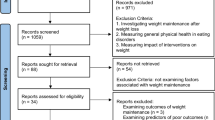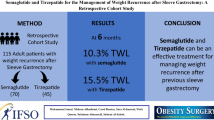Abstract
Background
Laparoscopic sleeve gastrectomy (LSG) results in significant, sustainable weight loss in obese individuals (body mass index (BMI) ≥40 kg/m2 or BMI 35.0–39.9 kg/m2 with major comorbidity). Average clinically expected % excess weight loss (%EWL) has been reported to be 56.1 % 1 year after LSG. Unrealistic weight loss expectations are purported to negatively impact treatment adherence and weight loss outcomes. This study examined the weight loss expectations of LSG candidates in Newfoundland and Labrador, Canada.
Methods
The Goals and Relative Weights Questionnaire was administered before the start of a bariatric surgery education session to 84 consecutive LSG candidates. Patients reported postoperative weight loss expectations in four categories: “dream”, “happy”, “acceptable”, and “disappointed”.
Results
Participants included 69 women and 15 men with an average age and weight of 43.7 years and 136.7 kg. The patients reported average postoperative “dream” and “happy” weights as 71.1 and 80.0 kg, respectively. Patients reported a weight of 86.2 kg as “acceptable” but would be “disappointed” with a weight of 105.6 kg. To achieve the desired amount of weight loss for each category, patients would have to achieve %EWLs of 88.7, 76.4, 68.2, and 40.6 %, respectively.
Conclusions
Patients have higher weight loss expectations than those that are clinically expected within 1 year after LSG.


Similar content being viewed by others
References
Picot J et al. The clinical effectiveness and cost-effectiveness of bariatric (weight loss) surgery for obesity: a systematic review and economic evaluation. Health Technol Assess. 2009;13(41):1–190. 215–357, iii–iv.
Lau DC et al. 2006 Canadian clinical practice guidelines on the management and prevention of obesity in adults and children [summary]. CMAJ. 2007;176(8):S1–13.
Sjöström L et al. Effects of bariatric surgery on mortality in Swedish obese subjects. N Engl J Med. 2007;357(8):741–52.
Karmali S et al. Laparoscopic sleeve gastrectomy: an innovative new tool in the battle against the obesity epidemic in Canada. Can J Surg. 2010;53(2):126–32.
Shi X et al. A review of laparoscopic sleeve gastrectomy for morbid obesity. Obes Surg. 2010;20(8):1171–7.
Fischer L et al. Excessive weight loss after sleeve gastrectomy: a systematic review. Obes Surg. 2012;22(5):721–31.
Victorzon M. An update on sleeve gastrectomy. Minerva Chir. 2012;67(2):153–63.
Padwal R et al. Bariatric surgery: a systematic review of the clinical and economic evidence. J Gen Intern Med. 2011;26(10):1183–94.
Dumon KR, Murayama KM. Bariatric surgery outcomes. Surg Clin North Am. 2011;91(6):1313–38. x.
Ames GE et al. Changing weight-loss expectations: a randomized pilot study. Eat Behav. 2005;6(3):259–69.
Anderson DA et al. Weight goals in a college-age population. Obes Res. 2003;11(2):274–8.
Dutton GR et al. Weight loss goals of patients in a health maintenance organization. Eat Behav. 2010;11(2):74–8.
Foster GD et al. Obese patients’ perceptions of treatment outcomes and the factors that influence them. Arch Intern Med. 2001;161(17):2133–9.
Foster GD et al. What is a reasonable weight loss? Patients’ expectations and evaluations of obesity treatment outcomes. J Consult Clin Psychol. 1997;65(1):79–85.
Masheb RM, Grilo CM. Weight loss expectations in patients with binge-eating disorder. Obes Res. 2002;10(5):309–14.
Wamsteker EW et al. Unrealistic weight-loss goals among obese patients are associated with age and causal attributions. J Am Diet Assoc. 2009;109(11):1903–8.
Provencher V et al. Defined weight expectations in overweight women: anthropometrical, psychological and eating behavioral correlates. Int J Obes (Lond). 2007;31(11):1731–8.
Teixeira PJ et al. Who will lose weight? A reexamination of predictors of weight loss in women. Int J Behav Nutr Phys Act. 2004;1(1):12.
Heinberg LJ, Keating K, Simonelli L. Discrepancy between ideal and realistic goal weights in three bariatric procedures: who is likely to be unrealistic? Obes Surg. 2009;20(2):148–53.
Kaly P et al. Unrealistic weight loss expectations in candidates for bariatric surgery. Surg Obes Relat Dis. 2008;4(1):6–10.
Karmali S et al. What is my goal? Expected weight loss and comorbidity outcomes among bariatric surgery patients. Obes Surg. 2010;21(5):595–603.
White MA et al. Do patients’ unrealistic weight goals have prognostic significance for bariatric surgery? Obes Surg. 2007;17(1):74–81.
Byrne SM. Psychological aspects of weight maintenance and relapse in obesity. J Psychosom Res. 2002;53(5):1029–36.
Dalle Grave R et al. Weight loss expectations in obese patients and treatment attrition: an observational multicenter study. Obesity Res. 2005;13(11):1961–9.
Cooper Z, Fairburn CG. A new cognitive behavioural approach to the treatment of obesity. Behav Res Ther. 2001;39(5):499–511.
Rothman AJ. Toward a theory-based analysis of behavioral maintenance. Health Psychol. 2000;19(1 Suppl):64–9.
Linde JA et al. Are unrealistic weight loss goals associated with outcomes for overweight women? Obes Res. 2004;12(3):569–76.
Linde JA et al. Weight loss goals and treatment outcomes among overweight men and women enrolled in a weight loss trial. Int J Obes (Lond). 2005;29(8):1002–5.
Jeffery RW, Wing RR, Mayer RR. Are smaller weight losses or more achievable weight loss goals better in the long term for obese patients? J Consult Clin Psychol. 1998;66(4):641–5.
Prochaska JO, DiClemente CC, Norcross JC. In search of how people change. Applications to addictive behaviors. Am Psychol. 1992;47(9):1102–14.
Montero PN et al. Reported excess weight loss after bariatric surgery could vary significantly depending on calculation method: a plea for standardization. Surg Obes Relat Dis. 2010;7(4):531–4.
Metropolitan Life Insurance Company. 1983 metropolitan height and weight tables. Stat Bull Metrop Life Found. 1983;64(1):3–9.
Padwal RS et al. Characteristics of the population eligible for and receiving publicly funded bariatric surgery in Canada. Int J Equity Health. 2012;11:54.
Sarwer DB et al. Self-reported stigmatization among candidates for bariatric surgery. Obesity (Silver Spring). 2008;16 Suppl 2:S75–9.
WHO Consultation on Obesity, Obesity: preventing and managing the global epidemic. In: WHO technical report series. 2000, World Health Organization: Geneva.
Libeton M et al. Patient motivation for bariatric surgery: characteristics and impact on outcomes. Obes Surg. 2004;14(3):392–8.
Heinberg LJ, et al. Older bariatric surgery candidates: is there greater psychological risk than for young and midlife candidates? Surg Obes Relat Dis. 2011.
Crawford R, Glover L. The impact of pre-treatment weight-loss expectations on weight loss, weight regain, and attrition in people who are overweight and obese: a systematic review of the literature. Br J Health Psychol. 2012;17(3):609–30.
Engstrom JL et al. Accuracy of self-reported height and weight in women: an integrative review of the literature. J Midwifery Womens Health. 2003;48(5):338–45.
Acknowledgments
The first author received a graduate student stipend from the Faculty of Medicine, Memorial University of Newfoundland and the Newfoundland and Labrador Centre for Applied Health Research. The study was researcher-initiated and did not receive funding. The authors would like to thank the Translational Research Program in Bariatric Care team, the Bariatric Care Clinic at Eastern Health, Dr. Foster, Dr. Karmali, and the research participants.
Conflict of Interest
The authors, Hilary Price, Dr. Deborah Gregory, and Dr. Laurie Twells, have no conflicts of interest to declare.
Author information
Authors and Affiliations
Corresponding author
Rights and permissions
About this article
Cite this article
Price, H.I., Gregory, D.M. & Twells, L.K. Weight Loss Expectations of Laparoscopic Sleeve Gastrectomy Candidates Compared to Clinically Expected Weight Loss Outcomes 1-Year Post-surgery. OBES SURG 23, 1987–1993 (2013). https://doi.org/10.1007/s11695-013-1007-y
Published:
Issue Date:
DOI: https://doi.org/10.1007/s11695-013-1007-y




